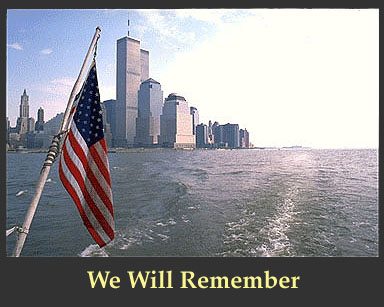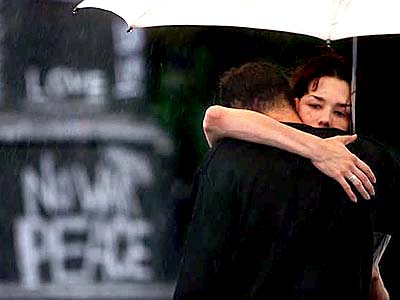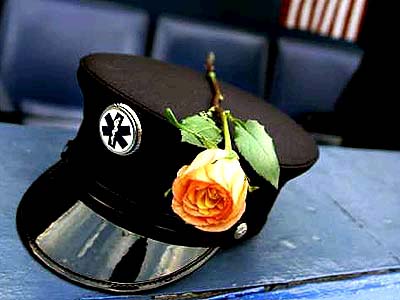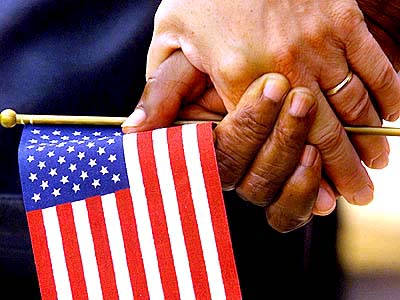 |
 |
|
|
 of Grief and Renewal |
|
I am sure all of you in USA will soon recover from the shock of the one of the worst devastation in human history caused by some fanatics for no purpose. I pray to the Almighty for the tens of thousands of innocent souls. Dr.Dipankar Chakraborty Through the present we want to express our solidarity and grief in these pain moments and its anguishes for the American town. We are praying for all the American families that suffered this tragedy. We want to express our reject against these acts that attempt against the human life. The Family, Manos Creadoras
And Cain regretted already that he hit him. He fell to the ground next to his brother, And he began to cry from one corner of the world to the other. I'm begging you, please open your eyes. Please forgive me, I'm begging you a million times -- Please come back, and open your eyes. <><><><><><><>
Christian Science Monitor Creating security in an uncivil world (WASHINGTON) How can we put the civil back into civilization? Tuesday's horrific attacks snapped us into a profoundly different and much more dangerous world. More than one of history's pages has turned. We seem to have stepped into a whole new chapter of human history, with the story going the wrong way. The very tools that brought us forward now leave us each feeling more vulnerable. We already knew that our indispensable computers could be used against us; now we discover that our trusted passenger airplanes can be made into excellent bombs. We travelers were confident in statistics showing that we were safer in the air than on the drive to the airport. Now we recognize that all it takes is a kamikaze pilot to convert a haven into a guided missile bigger than anything in the military's arsenal. It is more than the recognition that our tools can be turned against us. What really marks this new chapter is the shock of discovering a willingness to kill that exceeds anything the modern military has in mind. Just when we thought we'd invented forms of war that were almost bloodless, we find among us people willing to kill at levels we thought humanly impossible. Indeed, the enemies waging this new combat seem to prefer hugely lethal tactics. Fuel-filled airplanes are not required. In Rwanda just a few years ago, malevolent "leaders" set neighbor killing neighbor. Eight hundred thousand citizens died in a hundred days, many hacked to death by teenagers with farm-tool machetes. In this new, dangerous world, a community whipped to a frenzy by demagogues with a radio station can be as deadly as a nuclear bomb. In a fragile society, the shock waves of refugees, disease, and destruction can roll through whole countries. Click here for more: <><><><><> Larry Seaquist
 Thoughts regarding countering terrorist attacks The remarkable and horrifying success of the most recent terrorist attacks against the United States must create a universal need to understand the causes, rather than just the symptoms, of terrorism. We can all agree that those believing they have something positive in life to lose are less likely to sacrifice their lives for a cause than those believing something in their future, in a life after death, will be better than their temporal state. Therefore, to lessen the size of the army of those willing to die for a fundamental religious cause we, who wish to live peaceful and constructive lives, are faced with a clear course of action. We must either take economic action which will significantly improve the present lives of those currently believing that only a heaven, with or without 70 virgins awaiting them, can provide peace, comfort and satisfaction, no matter the effort applied or disabuse them regarding the existence of a life after death..In other words, if we provide economic opportunity and/or persuade that all there is or will be is that which is here and now, the numbers of those willing to throw their lives away for naught will logically be reduced. Abject poverty, causing a lack of hope for a better life and those orchestrating religious belief are necessary for the creation and management of zealots and it is the zealots which are so capable of creating such disproportionate pain and suffering. By providing for vocational education and economic opportunity, as well as debunking religions which promise future entry to a heaven in return for committing heinous and evil acts in the present, the fatal attraction of religion-based terrorism would be destroyed. Arthur Lipper
How Every Business Person Can Fight
Back Terrorists want to do more than kill people and destroy property. They want to undermine our confidence. They want to destroy our economy. When the trauma and grieving begin to subside, when the lost are accounted for, when the guilty are punished, when the heroes are thanked -- it's still not over. These terrorists hope to drive our nation into a recession or depression that cripples our ability to fight back and threatens our ability to lead and defend the world. Each of us can fight back. Each of us can work to secure the economic foundation that supports this country. Economics are about confidence as much as they are about money. Here are some of the things you can do to show we are strong and will not be stopped: 1. OPEN YOUR DOORS AND GO TO WORK. As soon as possible, make it clear that you're still in business and working hard. The ice cream truck drivers were back on their routes the morning after the disaster. 2. SUPPORT YOUR EMPLOYEES. Provide emotional and economic assistance to those in need. Provide paid leave, emotional counseling, and a helping hand to those who need it. People may be troubled inside even if they don't show it on the outside. 3. SHOW PATRIOTISM IN THE WORKPLACE. Fly the American flag. 4. FIND A WAY TO HIRE ONE EXTRA PERSON. Try giving a steady job to a temporary worker, or a full-time spot to a part-timer. 5. SUPPORT YOUR PEERS IN TROUBLE. Many businesses were severely hurt. Do what you can to help those you know. Ideas: Share offices or storage space with those who lost it; be lenient on collecting receivables; extend delivery time on contracts. 6. REPORT THE PROFITEERS. Watch for gas stations and retailers who use this disaster for personal profit. Expose them -- then never do business with them again. 7. USE WHAT YOU HAVE TO HELP. Use advertising space to promote charities. Link your company's home page to legitimate support organizations. Donate goods and services to the rescue and recovery effort. 8. STAY COOL. Tensions and stress are running high. Remind everyone to be extra polite and understanding. Help your operators and customer service reps deal with misdirected anger. 9. STAY POSITIVE. Attitude is everything. 10. STAY STRONG. Andrew Sernovitz 
On the events of September 11, 2001
Just two weeks ago, in New York, after the church service I met some of the families of the British victims. It was in many ways a very British occasion. Tea and biscuits. It was raining outside. Around the edge of the room, strangers making small talk, trying to be normal people in an abnormal situation. And as you crossed the room, you felt the longing and sadness; hands clutching photos of sons and daughters, wives and husbands; imploring you to believe them when they said there was still an outside chance of their loved ones being found alive, when you knew in truth that all hope was gone. And then a middle aged mother looks you in the eyes and tells you her only son has died, and asks you: why? I tell you: you do not feel like the most powerful person in the country at times like that. Because there is no answer. There is no justification for their pain. Their son did nothing wrong. The woman, seven months pregnant, whose child will never know its father, did nothing wrong. They don't want revenge. They want something better in memory of their loved ones. I believe their memorial can and should be greater than simply the punishment of the guilty. It is that out of the shadow of this evil, should emerge lasting good: destruction of the machinery of terrorism wherever it is found; hope amongst all nations of a new beginning where we seek to resolve differences in a calm and ordered way; greater understanding between nations and between faiths; and above all justice and prosperity for the poor and dispossessed, so that people everywhere can see the chance of a better future through the hard work and creative power of the free citizen, not the violence and savagery of the fanatic. Round the world, 11 September is bringing governments and people to reflect, consider and change. And in this process, amidst all the talk of war and action, there is another dimension appearing. There is a coming together. The power of community is asserting itself. We are realising how fragile are our frontiers in the face of the world's new challenges. The world community must show as much its capacity for compassion as for force.
When we act to bring to account those that committed the atrocity of 11 September, we do so, not out of bloodlust. We do so because it is just. We do not act against Islam. The true followers of Islam are our brothers and sisters in this struggle. Bin Laden is no more obedient to the proper teaching of the Koran than those Crusaders of the 12th Century who pillaged and murdered, represented the teaching of the Gospel. The starving, the wretched, the dispossessed, the ignorant, those living in want and squalor from the deserts of Northern Africa to the slums of Gaza, to the mountain ranges of Afghanistan: they too are our cause. This is a moment to seize. Tony Blair
A Palestinian response Dear Friends, I've had numerous emails from people asking me to help interpret the scenes they have watched of Palestinians 'celebrating' after the event. Yes, there were some gatherings of people, particularly in Nablus, who were shown in the very early hours of the horrible attacks in the US on the street, dancing and cheering, and passing out chocolate. But, these expressions were few and certainly did not represent the feelings or mood of the general population. The deep shock and horror of the Palestinian people, the real sorrow for all the dead and wounded, was, and continues to be, unseen by the world, particularly in the USA. It is the story unheard. Because those few scenes were disturbing, the easy response is to cast judgment on the participants, naming those 'celebrating' as inhuman, despots, or despicable. The more difficult response, though, particularly in the midst of grief, is to ask the questions about what might drive people, men, women and children, to such actions. One might remember that the people who were seen 'celebrating' are a people who for almost a year have been under a brutal siege, who due to the siege have been unable to feed their families and hover on the brink of poverty and despair, who have watched their children and their parents killed by bullets, tank shells and guided missiles, most of which are supplied to the Israeli Occupation Army by the USA. One might remember such things as one watches those images. Attempting to understand motivations doesn't discount our feelings of anguish at such scenes, but does allow us to keep humanity a bit more in tack in a time of such utter brokenness.
Yesterday following a prayer service held at St. George's Anglican Cathedral, I talked briefly to the US Consul General in Jerusalem. We talked about the scenes from here which were most prevalent on the TV. He told me that his office had received a stack of faxes of condolences from Palestinians and Palestinian Organizations 'this high' (indicating a stack of about 12 inches). He asked his staff to fax a copy of every last one of them to CNN to give a different visual image from Palestine. When we left the cathedral after the service, we drove by the American Consulate in East Jerusalem. Gathered there were about 30 Palestinian Muslim schoolgirls with their teachers. Looking grief-stricken, they held their bouquets of dark flowers and stood behind their row of candles. Silently, they kept vigil outside our Consulate. But no cameras captured their quiet sorrow. When I got home, my neighbor explained that her son who is in 8th grade came home in the afternoon and talked to her about the students' reactions at school. He told her that everyone was talking about what had happened. He said that many were asking "How could someone do that?" "Is someone human who can carry out such acts?" He went on to tell her that many of the girls were crying. Friends, then, began stopping by my home. Palestinian Christian and Muslim came together, visiting me to express their sorrow and to ask what they could do. Again, the phone rang incessantly with Palestinians asking if everyone I knew was okay and asking if they could do anything to help. As we talked many went on to tell of stories of their loved ones who are in the States - relatives they were worried about having been injured or killed or who had been subject to harassment in the last couple of days. Others talked of having received emails from people who had been supporters of their work who wrote saying "I can never again support the Palestinian people," as if somehow Palestinians everywhere were suddenly responsible for the attacks in the States. The remarkable thing to me, though, was that despite such messages, these same people still wrote letters of condolences, made phone calls to friends, and asked what they could do to help. Despite the world, and particularly the American world, not seeing them or seeing them only as 'terrorists', Palestinians continued to express their common humanity with people everywhere as they shared in the heartache and dismay. Trusting in God's everlasting presence, Rev. Sandra Olewine,
A Change in New York I want to write you about New York City and then about the United States as a whole. I returned last night from New York City, and what I have seen has touched my heart. The city is different. Still lively and exciting, yet different. The city has become gentle. I walked the streets, I rode the buses, I took the subways, and not once did I hear an unkind word or a raised voice. A heavy, disheveled woman enters the bus I am riding. She stands at the front with a dollar bill in an outstretched hand and asks if anyone has change. I watch men dig into their pockets, women into their purses. One man asks how much she needs to ride the bus. Barriers came down on September 11. The color of the skin doesn't matter anymore. The age, the poorness -- these don't matter either. In New York City today, there is a gentleness. Barbara Wolf
 Earth Commandos $40 billion has been allocated by by the US Congress to use for military action to find our terrorist enemy, wherever they are, and destroy them. What if we also used $40 million ( .01% of the military budget) to catalyze the research on alternative sciences and development of environmental technologies that empower people and villages? Rather than just giving in to the forces of death, killing and terrorism....let our contribution also be toward life...toward the planet...toward all species. A celebration of the world's people, a compassion for their needs. We are Earth commando units, change agents, part of an emerging peace force which can build a sustainable future. We have a vast collection of appropriate technologies for the Muslim world and other developing countries. These technologies have not been needed because oil has been cheaper than drinking water. Our question to the billionaire parents of Bin Laden is: "How would you like to invest some of your oil money in renewable and regenerative technologies that can create a lasting peace and eliminate the need for the sale of weapons?" Elegant solutions and sustainable technologies exist now that can pull water out of thin air, that can green the deserts of central Asia with 4 harvests a year, that can capture solar energy from the sunshine that falls on Saudi Arabia. We can build many solar oases in Africa and the Mid-East using water to make the deserts bloom. We can rebuild the West Bank into sustainable desert eco-villages with Jew, Arab, and Christian living side by side, equal and together, tending their hydroponics gardens while children are learning about conflict resolution and ecological design. We can set up ecotels that can provide a new dimension to tourism. For the price of one B-1 bomber ($2 billion), we could build two thousand 1.4 megawatt wind turbines, the capacity of two Diablo Canyon nuclear power plants. These turbines could power a city the size of the San Francisco Bay Area with no fuel cost and no waste residue. Our question is: How can we implement programs that create security for the people? Reinhold Ziegler The language of conflict As we mourn the dead and missing from the recent horrific actions, we need to remember to also ask about our role in the world. To prevent further terrorist actions in the United States we need to know our enemy better than he knows himself. A key to our future safety will be to understand why he hates us so passionately that he is willing not only to kill himself but to kill thousands of innocent civilians. I suggest we need to understand, at the least, the cultural, economic, environmental, political and religious roots of this inflamed and passionate hatred of America and Americans. We were not attacked simply because we are the symbol of freedom and democracy, as President Bush told us in his first statements. We were also attacked because we are hated intensely for the abuses of our great global power and responsibility. We can only reclaim our long term security if we come to understand the roots of this hatred and, with time and effort, diminish it. We might, as suggested by L. F. Erz, also want to reflect on our language. Do we talk of "a vision of peace, partnership, equality and celebration of difference?" Do we speak of "healing social ills"? And do we see and understand "how the language and culture of domination and violence reinforce each other, and how continuing to speak in these terms can only bring us more of the same."? Or will we continue to talk only of fighting, defeating and winning? Jock Gill
A New World This is indeed a new world, but the question is: what lesson does it teach us? There is great and understandable thirst for retaliation against Tuesday's savage attacks. In the short term, that is almost inevitable. But it is not a long-term strategy against terrorism. If we want to end those desperate acts, we should think about ending the desperation. Perhaps instead of fueling a hot war with money and missiles, we could divert some of our existing -- and enormous -- military spending toward cooperative, constructive engagement with as much of the developing or isolated world as possible, not to overcome them with kindness and ideology but to embrace them as neighbors. If we continue to exploit others for immediate gain, we feed their discontent. If we form long-lasting partnerships, we become their friends. This would be not only good for security but for the economy as well, for everyone. The logic is the same as that of internal security: when we build more jails, we create more ex-cons; more schools equals a more productive, well-adjusted populace. In the international arena more guns translates into more fodder for terrorism; more opportunity means more allies. It's worked every time we've sincerely tried it, from the Marshall Plan on down. This is a new era, one that affords shocking understanding and, therefore, new opportunity for those who wish to see it. It is sad that we have to learn these lessons over such a long period and in such a costly way. It would be sadder still if we haven't learned them yet. Paul Swider
 Deadly Flowers The acts of the September 11 hijackers look insane. But if we let our understanding stop at this, and concentrate only on reprisal, we will actually make it harder to protect ourselves from terrorists, and to remove the root causes of terrorism. Their acts were insane; but the people were not. They were cold, calculating, talented, intelligent, relentless killers whose rage was banked for many years. They had families; they laughed, hoped, feared and mourned. The depth of their passion and commitment became visible to the world in the blooming of the deadly flowers of flame over the World Trade Center. They were committed one simple thing: to be heard. They felt they had no voice, no respect, and nothing to lose -- so their natural, human inhibitions about violence were suspended. Theirs is a moral cry, expressed by immoral means. As difficult as it may be, now we need to put ourselves into the minds of these people. We need to understand this enemy, to see the world as he sees it. Then the strategy for dealing with him, for truly eradicating his hatred, will become clear. Military action is a necessary short-term solution, to provide protection for the innocents to whom we have responsibility. But it is only part of the solution. The key in the coming months and years will be to strike the right balance between a short-term, cathartic response, needed to punish those responsible, and a long-term, compassionate response to address the rage underlying the acts of September 11, 2001. We're going to have to go deeper, and see ourselves in the mirror of this enemy's eyes. It will be a challenging examination, and we will not like some of what we see. But look we must. Michael North
The Peacemakers Speak A collection of responses to terrorism and the Sept.2001 attacks, from recent recipients of the Nobel Peace Prize. Click here: http://www.thecommunity.com/crisis/
|